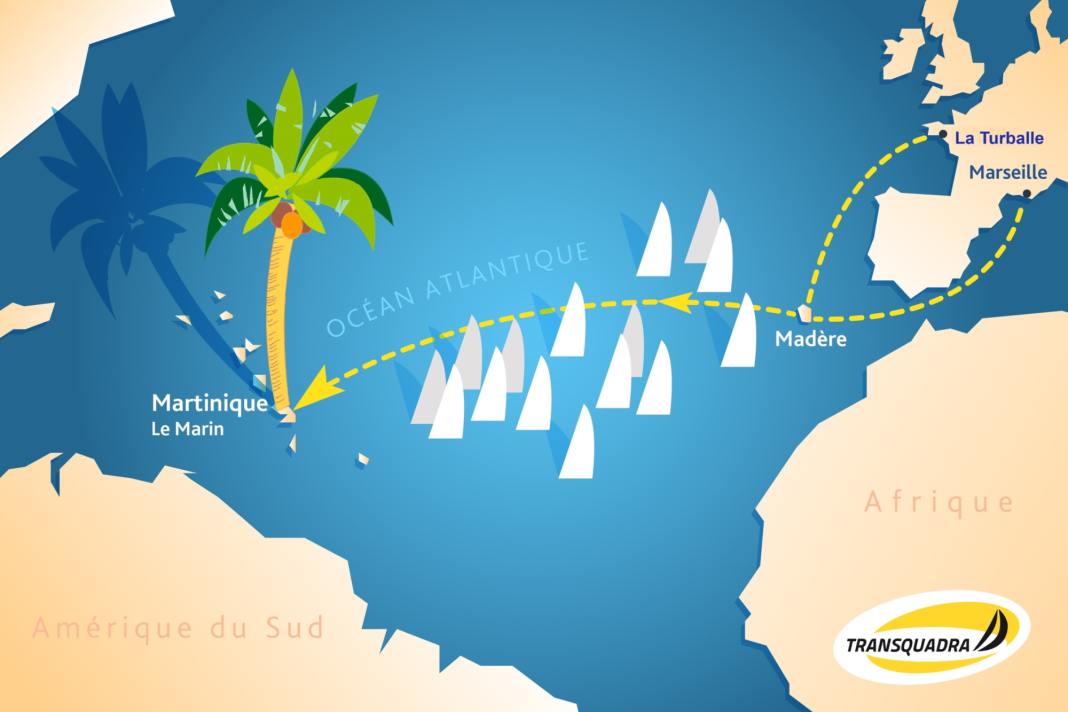Transquadra: Opening stage to Madeira started - Baltic 500 fathers in the race
Tatjana Pokorny
· 07.07.2024






While part of the Transquadra field already started the Transquadra 2024/2025 on Wednesday from the Olympic port city of Marseille, the majority of the field will now follow on 7 July from La Turballe. The prospective Transquadra Atlantic strikers had gathered at the host Club Nautique Hoedicais over the past few days and made final preparations for the first, shorter of the two stages to Madeira.
Among the 59 participants (21 soloists, 38 double-handed sailors on 19 boats) taking on this challenge from La Turballe are two German starters, Rasmus Töpsch and Cord Hall from the Yacht Club Strande. The fathers and creators of the double-handed classic Baltic 500 are in the race on their JPK 10.10 "Sharifa" with starting number 204.
Transquadra: from Turballe or Marseille via Madeira to Martinique
Located in the north of the Guérande peninsula, the fishing harbour and seaside resort of La Turballe gave the Transquadra fleet a warm welcome in the new harbour basin. The race for adventurers, budding Atlantic conquerors and experienced sea sailors got off to a good start here before the starting signal was given on Sunday. With the main start in La Turballe, the Transquadra returns to its roots, as the Transat two-parter via Madeira was created in the Atlantique region in 1993. The alternative start on 3 July from Marseille suited the crews based in the Mediterranean.
I don't think we've ever been more ready than we are now" (Rasmus Töpsch)
Rasmus Töpsch and Cord Hall have put four years of preparation into their joint Transat mission. "I don't think we've ever been more ready than we are now," said Rasmus Töpsch shortly before setting sail on the Sunday of the start. "Start fast, sail fast, arrive first and have a beer," smiled co-skipper Cord Hall, setting the motto for the North German double-handed crew, while the 58 sailors and one soloist were bid farewell by cheering fans, the sound of bagpipes and a good atmosphere in the harbour from La Turballe.
Many starters are travelling on JPKs, Sun Fast yachts, Pogos or First 31.7s. Occasionally, the challengers also rely on boats of the type Dehler 30 OD, J99, Ofcet 32 Course, Ace 30, C&C 115, RM 10.70, Figaro 2 or Gibsea 414. On their course from La Turballe to Funchal, the fleet got off to a rather gentle start on Sunday afternoon. On the regatta menu is a summer race with largely favourable conditions, but also a possible extended doldrums.
Race director Mico Bolo had this to say about the expectations before the upwind start: "A not very fast summer low is reaching the Bay of Biscay and will generate south-westerly winds of ten to twelve knots at the start. It will be accompanied by some clouds and precipitation. The fleet will be under the influence of this small low pressure system on Sunday and Monday."
Transquadra, part 1: to Madeira in a week?
From Monday, the wind is expected to shift to the south so that the sailors can open the sails and sail towards Cape Finisterre in ten to 15 knots of wind. On Tuesday, they should already be approaching Cape Finisterre, where the wind will die down. Here the field will have to deal with a windless to calm weather transition zone. Mico Bolo said: "All the routers recommend keeping the course as short as possible and passing inside the DST (navigation zone off La Coruña reserved for commercial maritime traffic). The first competitors should pass the Spanish tip on Tuesday evening or Wednesday morning."
Instead of the feared rain, the sun is shining on our fur" (Cord Hall)
Redemption should follow at the latest at the height of Porto. This is where the conveyor belt of the Portuguese trade winds should roll out for all participants and pave the way to Madeira. The overture to the actual Transat jump at the beginning of the coming year promises a lot of excitement. The anticipation among the sailors in the harbour was correspondingly high. The soloists were sent on their course at 3.08 pm in the afternoon, which, according to current forecasts, should take them to Funchal in six to seven days. Under grey, overcast skies, the Transquadra doubles also set off 20 minutes later.
A good hour and a half after the Transquadra start, the "Sharifa" crew contacted YACHT online. Cord Hall reported on the start and the first few nautical miles, saying: "Instead of the rain we feared, the sun is shining on us. We are doing great." The start was moderately successful. "A few others found better positions," conceded Hall, while the crew were already putting the pedal to the metal again. A confused wave made life difficult for all Transquadra sailors at the start.
Something falls away from you" (Rasmus Töpsch)
Three to four days of "quite a lot of upwind sailing" is probably on the cards, says Cord Hall. While the original routings were still a good seven and a half days for the course, the latest forecasts were for more than eight days of racing. Both Cord Hall and Rasmus Töpsch found it exhilarating and liberating to finally be on the road. "After four years of preparation, something falls away from you," said Rasmus Töpsch.

